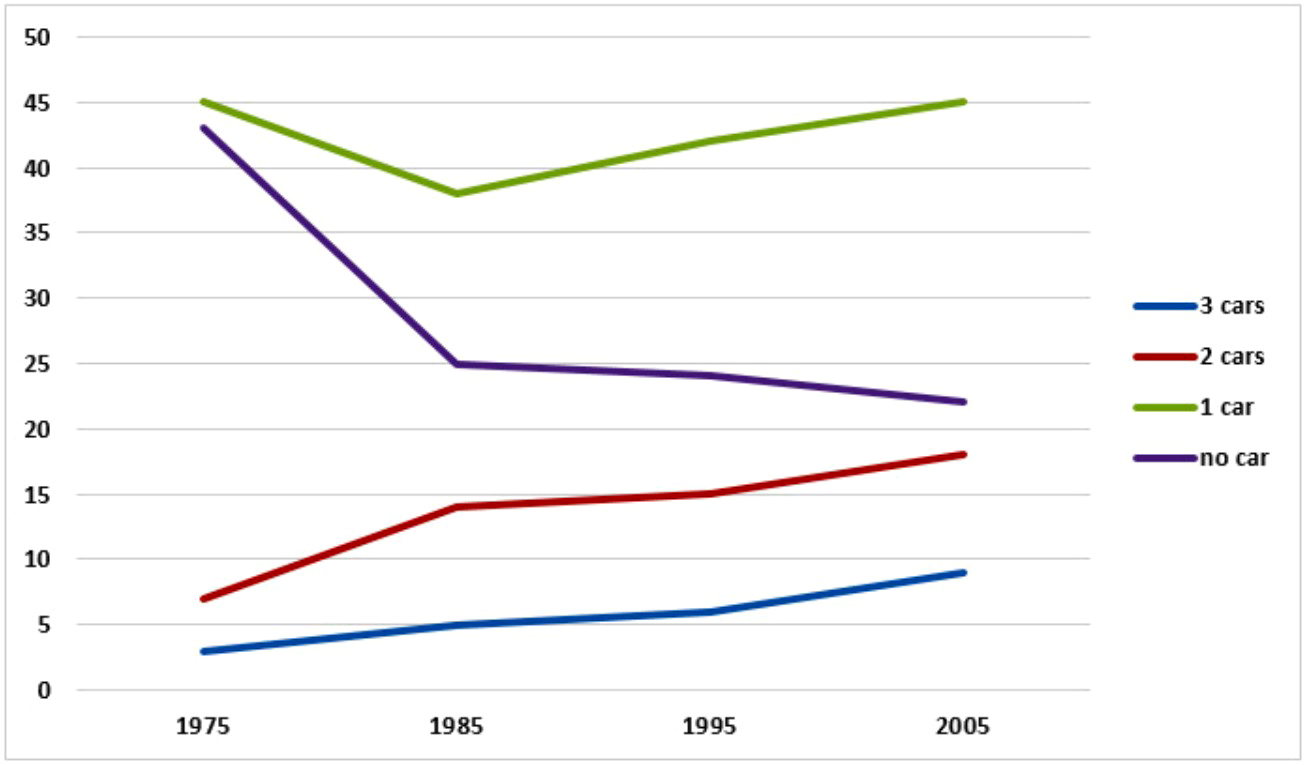The chart below gives information about car ownership in the UK from 1975 to 2005. (percentage)
Write at least 150 words.

WRITING TASK 2
You should spend about 40 minutes on this task
Write about the following topic:
Many business owners find that their staff lack sufficient interpersional skills such as the ability to cooperate their coworkers. What are the causes?
Can you suggest some possible solutions?
Give reasons for your answer and include any relevant examples from your own knowledge or experience.
Write at least 250 words.
WRITING TASK 1
The line graph shows how car ownership in the UK changed between 1975 and 2005.
Overall, the proportion of people who owned two or three cars rose while the figure for those who owned no car declined. Additionally, having one car was the most common situation during the period shown.
In 1975, nearly half of the UK population had one car while people with no car took up a smaller percentage, at roughly 43%. These figures both declined over the following ten years, to around 37% for people having one car and 25% for those with no car. The percentage of those who owned 2 or 3 cars was approximately 7% and 3% respectively in 1975, and both experienced increases over the next 10 years to around 13% and 5% respectively.
Over the next 20 years, the percentage of those with one car gradually rose back up to 45% whereas the percentage of those with no car continued to decline to about 22%. On the other hand, the proportion of people having 2 or 3 cars continued to rise over the following 20 years to 19% and 9% respectively.
(189 words – Band 8.0)
WRITING TASK 2
Some employers nowadays are observing that their newly-hired staff lack fundamental interpersonal skills, such as teamwork. This problem results from a number of cause to which several solutions will be proposed in this essay.
First, the lack of interpersonal skills in new employees is attributable to the nature of their previous workplace. In many companies, employees are divided into departments and work in small separate spaces or cubicles, in which each member is assigned particular tasks unrelated to their colleagues. Opportunities to share experience or exchange work-related subjects therefore rarely arise and teamwork skills cannot be developed. A lack of proper training during time at university could be another cause. Tertiary education nowadays seems to place more emphasis on training students to excel in their major through theoretical subjects rather than equipping them with fundamental soft skills. Many fresh graduates as a result are unable to collaborate effectively with their co-workers once entering the workforce despite having extensive expertise.
There are some solutions that can be implemented by companies and universities to address the problem. For instance, companies need to alter the way in which their employees work in order to create more opportunities for colleague interaction. Instead of working individually, projects could be more teamwork-orientated. Also, the grading criteria currently applied at university need to be changed to incorporate more soft skill training. Apart from compulsory major-related subjects, students should also be engaged in workshops or subjects specializing in job-related skills. All of these subjects will count towards students’ overall GPA when they gradate to ensure they are well-equipped with appropriate workplace skills.
In conclusion, a lack of basic interpersonal skills in new employees stems from businesses’ workplace practices and the educational system, and there are a number of feasible solutions to tackle this issue.
(296 words – Band 8.5)
